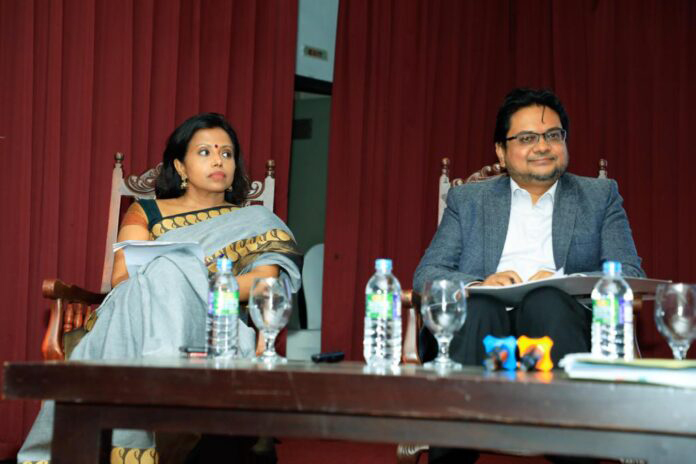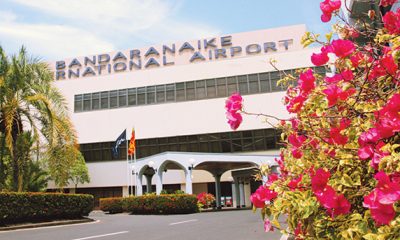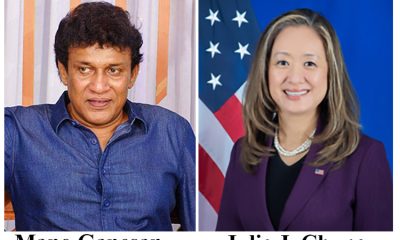News
CSCD takes up battle cry for elections

The Civil Society Collective for Democracy (CSCD) says that recent statements from the President, the Speaker and some other MPs who attempt to undermine judicial independence are deeply troubling.
CSCD says that the 21st Amendment to the Constitution has re-established the independent commissions, but the recent acts of intimidation targeting members of the Election Commission and the Public Utilities Commission are examples of the disabling environment that has been created for these institutions. “At the heart of the matter, citizens’ sovereign right to vote has been infringed upon using financial constraints as an excuse, an explanation lacking credibility. Currently Sri Lankans have no elected representatives at local and provincial levels and these institutions are governed by unelected officials controlled by a centralised executive. This if not addressed soon may call into question the definition of Sri Lanka as a democracy,” it said in a statement issued to the media following a meeting held at the Sri Lanka Foundation Institute (SLFI) in Colombo on Tuesday (29).
CSCD is a coalition of concerned citizens and organizations including civil society organizations, professionals, academics, trade unions, youth leaders, activists, media personnel, religious figures, and other influencers, convened the meeting to deliver a crucial wake-up call to the nation’s political leaders. The urgent call is to halt state repression and safeguard the democratic rights of the people, in order to ensure actual and equitable economic recovery.
The CSCD expresses deep concern over the rapid shrinking of democratic space within the country, with Constitutionally guaranteed rights and freedoms such as the freedom of expression, right to information, right to dissent, right to protest, freedom of association and the right to franchise being snatched away, leaving citizens often powerless. This surge in silencing voices and the targeting and harassment of those who question the authorities, have created a chilling effect among the people, leading to self-censorship.
Furthermore, the rulers have been abusing the International Covenant on Civil and Political Rights (ICCPR) and the contentious Prevention of Terrorism Act (PTA) to target political opponents, civil society activists, and journalists, contrary to international commitments, including those made at the United Nations Human Rights Council (UNHRC). The recent attempts to introduce extremely oppressive versions of laws such as the Anti-Terrorism Act, Broadcasting Commission Act and the NGO Act are examples of Government’s attempt to threaten and control democratic space.
To uplift Sri Lanka from the economic crisis, it is essential to address its root causes – poor governance, lack of inclusivity and corruption. Unless these fundamental issues are addressed, Sri Lanka will continue to be considered as a complex investment context that will discourage investors and thus hamper economic recovery.
Ensuring transparency and accountability in governance is essential to prevent corruption and to ensure good governance. For people to be able to hold their representatives and the stewards of public resources accountable, they need to be able to exercise their democratic rights and freedoms. A truly democratic system would enable citizens to elect and vote out their representatives regularly, be involved and informed of all Government’s decisions that affect their lives, be able to dissent and make their voices heard in protest and be able to form collectives and exert pressure on the authorities to change course when necessary.
A government that acts in the best interest of the people and is genuine in its effort to uplift the economy will not hesitate to expose themselves to public scrutiny.
In line with these principles, the CSCD calls upon the political establishment to take immediate steps to uphold and defend the foundational principles of democracy by:
– Ensuring that free and fair elections essential for inclusion are held on time, starting immediately with the Local Government and Provincial Council Elections.
– Uphold the fundamental rights of citizens, including freedom of expression and association and right to information.
– Protect civic space and create an enabling environment for civil society activism.
– Ensure citizen consultation and participation in steering economic recovery.
– Govern with transparency and accountability, ensuring full public scrutiny.
– Empower the independent commissions to fulfill their roles effectively.
– Take a genuine effort to implement essential anti-corruption reforms.
-Take action to prosecute past and present acts of corruption to end the climate of impunity,” the CSCD said.
News
US sports envoys to Lanka to champion youth development

The U.S. Embassy in Colombo welcomed the U.S. Sports Envoys to Sri Lanka, former National Basketball Association (NBA) and Women’s National Basketball Association (WNBA) players Stephen Howard and Astou Ndiaye, from June 8 through 14.
The Public Diplomacy section of the U.S. Embassy said that it would launch a weeklong basketball program intended to harness the unifying power of sports, made possible through collaboration with Foundation of Goodness and IImpact Hoop Lab.
While in Sri Lanka, Howard and Ndiaye, both retired professional basketball players, will conduct a weeklong program, Hoops for Hope: Bridging Borders through Basketball. The Sports Envoys will lead basketball clinics and exhibition matches and engage in leadership sessions in Colombo and Southern Province for youth aged 14-18 from Northern, Uva, Eastern and Western Provinces, offering skills and leadership training both on and off the court. The U.S. Envoys will also share their expertise with the Sri Lanka Basketball Federation, national coaches, and players, furthering the development of basketball in the country. Beyond the clinics, they will collaborate with Sri Lankan schoolchildren to take part in a community service project in the Colombo area.
“We are so proud to welcome Stephen and Astou as our Sports Envoys to Sri Lanka, to build on the strong people-to-people connections between the United States and Sri Lanka,” said U.S. Ambassador Julie Chung. “The lessons that will be shared by our Sports Envoys – communication, teamwork, resilience, inclusion, and conflict resolution – are essential for leadership development, community building, equality, and peace. The U.S. Sports Envoy program is a testament to our belief that sports can be a powerful tool in promoting peace and unity.”
News
Rahuman questions sudden cancellation of leave of CEB employees

SJB Colombo District MP Mujibur Rahuman in parliament demanded to know from the government the reasons for CEB suspending the leave of all its employees until further notice from Thursday.
MP Rahuman said that the CEB has got an acting General Manager anew and the latter yesterday morning issued a circular suspending leave of all CEB employees with immediate effect until further notice.
“We demand that Minister Kanchana Wijesekera should explain this to the House. This circular was issued while this debate on the new Electricity Amendment Bill was pending. There are many who oppose this Bill. The Minister must tell parliament the reason for the urge to cancel the leave of CEB employees,” the MP said.However, Speaker Mahinda Yapa Abeywardena prevented Minister Wijesekera responding to the query and said that the matter raised by MP Rahuman was not relevant.
News
CIPM successfully concludes 8th Annual Symposium

The Chartered Institute of Personnel Management (CIPM) successfully concluded the 8th Annual CIPM Symposium, which took place on 31st May 2024. Themed “Nurturing the Human Element—Redefining HRM in a Rapidly Changing World,” the symposium underscored the pivotal role of human resource management (HRM) in today’s dynamic global landscape. Since its inception in 1959, CIPM has been dedicated to advancing the HR profession through education, professional development, and advocacy, solidifying its position as Sri Lanka’s leading professional body for HRM.
Ken Vijayakumar, the President of the CIPM, graced the occasion as the chief guest. The symposium commenced with the welcome address by the Chairperson, Prof. Arosha Adikaram, followed by the Web Launch of the Symposium Proceedings and Abstract Book by the CIPM President. The event featured distinguished addresses, including a speech by Chief Guest Ken Vijayakumar, President of CIPM, and an address by Guest of Honor Shakthi Ranatunga, Chief Operating Officer of MAS Holdings Pvt. Ltd., Sri Lanka.
The symposium also featured an inspiring keynote address by Prof. Mario Fernando, Professor of Management and Director of the Centre for Cross Cultural Management (CCCM) at the University of Wollongong, Australia.
Vote of Thanks of the inauguration session was delivered by Dr. Dillanjani Weeratunga, Symposium Co-chair.
The symposium served as a comprehensive platform for researchers to present their findings across a wide range of critical topics in HRM. These included Cultural Diversity and Inclusion, Talent Development and Retention, Ethical Leadership and Corporate Social Responsibility, Adapting to Technological Advancements, Mental Health and Well-being at Work, Global Workforce Challenges, Employee Empowerment, and Reskilling and Upskilling.
The plenary session was led by Prof. Wasantha Rajapakse. Certificates were awarded to the best paper presenters during the valedictory session, followed by a vote of thanks delivered by Kamani Perera, Manager of Research and Development.
The annual symposium of CIPM was a truly inclusive event, attracting a diverse audience that spanned undergraduates, graduates, working professionals, research scholars and lecturers. This widespread interest highlights the symposium’s significance in the field of HRM, offering a unique opportunity for everyone to network and learn from scholarly brains.The CIPM International Research Symposium was sponsored by Hambantota International Port, Sri Lanka Institute of Information Technology (SLIIT), E B Creasy & Co. PLC, and Print Xcel Company.
























